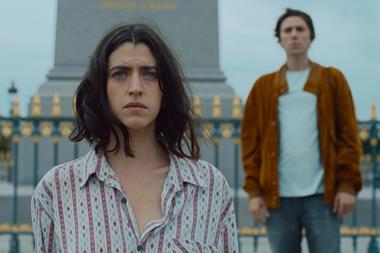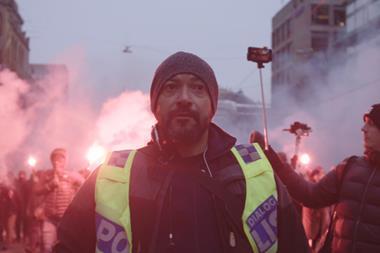The ongoing production boom at UK studios and increased attention to sustainability in filmmaking have been highlighted by a leading HBO executive, UK facilities director and environmental expert.
Talking at Screen and Broadcast’s Restart conference, panel chair and British Film Commission CEO Adrian Wootton stated that the pandemic had “accelerated” the demand for content, leading to rapid expansion of studio facilities across every part of the UK.
Watch the session in full, above.
Speaking on the panel, Janet Graham Borba, executive vice president of production at HBO and HBO Max, confirmed that production for the premium pay-TV network was “busier now than it was before the pandemic”.
“Every [show] is back up and running - and then some,” she confirmed.
In response to the studio capacity crunch in the UK, HBO recently developed its own shooting space in the old Park Royal industrial park in Ealing for its Victorian fantasy drama, The Nevers, and is exploring the use of that space for further projects.
“Stage space is at a premium and is fully booked for many years going forward,” said Borba. “We have the good luck to be a sister division of Warner Bros. and we have a couple of shows placed at [Warner’s facility] Leavesden very successfully. But not every show is right for there.”
The converted space where The Nevers shot is around 300,000 square feet with two large open spaces that make “good sound stages”. HBO was also able to base workshops and set up office space at the new facility.
“We have a relatively long-term lease, I think it’s about five years,” said Borba of the facility. “When The Nevers is finished, if it is finished before then, we would put another show there or sub-let it to others to do so.”
In spite of the surge in production activity, Borba acknowledged that Covid has “coloured” every part of the filmmaking process, adding new challenges.
“It is not only that there are protocols to observe but that those protocols are complex to observe,” she explained. “They take more physical space. They mean the work takes more time as people can’t work close to one another, the way we are all used to working.
“They [the protocols) are much more expensive… and they’re challenging and stressful. You’re trying to make a spectacular show in a sustainable way and to diversify your workforce while keeping everyone safe in a pandemic.”
Demand outstripping supply
Echoing Borba’s remarks about soaring rates of production, Rob Page, commercial director at Space Studios Manchester and The Sharp Project, spoke of increasing demand at his facility.
“I think if you spoke to any other stage space provider, they would say the same thing - demand is outstripping supply,” he said. “We definitely had our best year ever pre-Covid in terms of the occupancy rates we achieved.”
Space Studios Manchester established in 2014 and currently has 85,000 square feet of studio space spread across six stages. Alongside the stages are 45,000 square feet of “tented business units” containing everything a make-up school to camera equipment companies. Series ranging from Peaky Blinders and Cold Feet to Devs and Intergalactic have shot there. The site is expanding with two new 20,000 square feet stages expected to being construction later this year - and to be ready for use by 2023.
The Space Studios executive also cited research from real estate consultant Lambert Smith Hampton, which estimated the UK would need a further 1.9 million square feet of studio space to cater to the needs of the film and TV sector over the next 15 years. Speaking of the situation in Manchester, he said that “business is back to normal and those high occupancy rates that we were achieving pre-Covid, we are definitely starting to achieve those as well.”
Serious about sustainability
Also on the panel, environmental sustainability consultant Louise Marie Smith had a positive message about how UK studios are now taking environmental sustainability more seriously than ever before.
“Since everybody returned to work, it has been even more so,” Smith said of the increased attention toward sustainability as filmmaking has resumed post lockdown.
“That time to stop and think was used wisely,” she suggested of how studios and streamers have been dealing with environmental issues while also addressing new Covid protocols.
Portable electric batteries are increasingly being used by crews on location instead of eco-unfriendly diesel generators; low energy LED lighting is readily available to hire; and electrified vehicle fleets and solar trailers are becoming increasingly commonplace. Film London is also moving ahead with its “Grid Project” to supply green energy for film unit bases in central London.
Smith argued that sustainable approaches to film production should have an economic dividend in the long term.
“The trick is to play it all the way through to the end and look at it holistically,” she said. “The rental on a newer technology is likely to cost more per week but if you look at the full picture, whether that be an electric vehicle…[or] LED lighting, if they use 80% less fuel, you’re probably going to save money.”
The main challenge now, Smith suggested, is to convert older film facilities heated by gas or “old, inefficient electric heaters on the wall” to more eco-friendly energy strategies.
It is an approach that chimes with established companies like HBO, which is consciously seeking to cut back on their use of fossil fuels.
“What that social responsibility looks like to me is a reduced carbon footprint, a deeper connection to community, a more diverse workforce,” said HBO’s Borba as she called for “a more elevated conversation about all of those issues, about how we can all behave as citizens together.”
The session was sponsored by the British Film Commission






![The Brightest SunScreen[Courtesy HKIFF]](https://d1nslcd7m2225b.cloudfront.net/Pictures/274x183/3/5/0/1448350_thebrightestsunscreencourtesyhkiff_312678.jpg)




























No comments yet